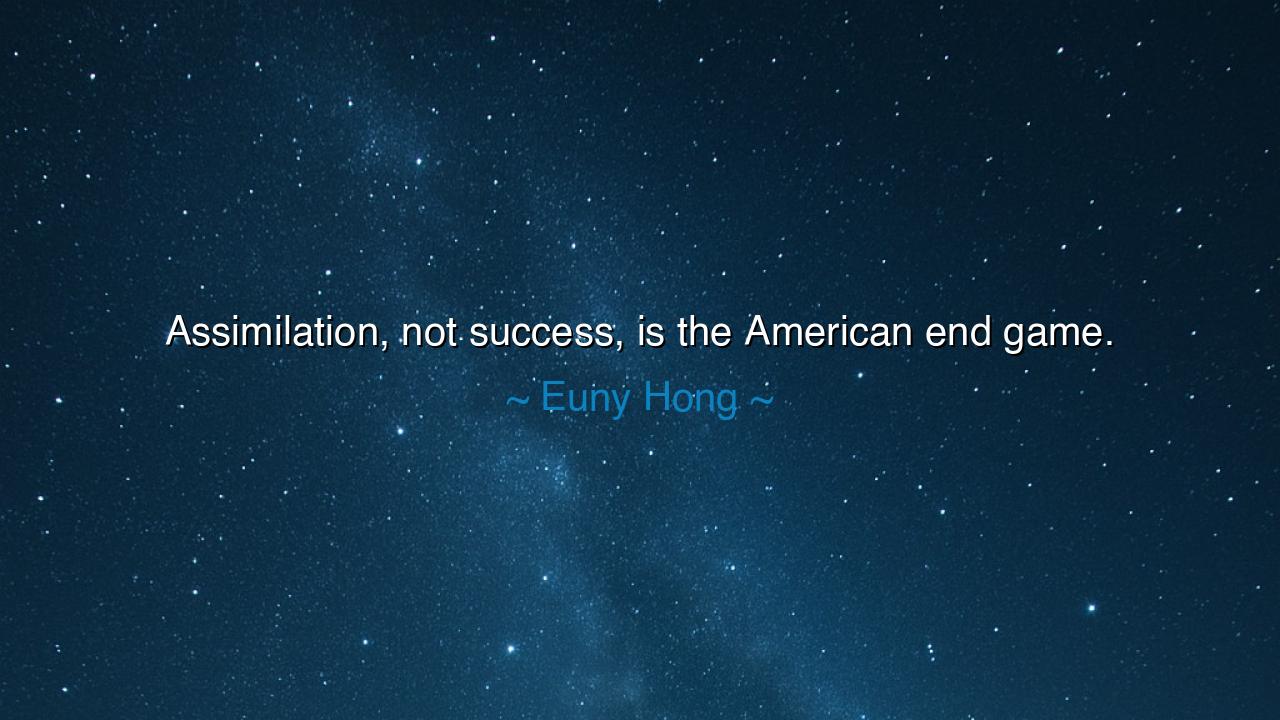
Assimilation, not success, is the American end game.






Hear the words of Euny Hong, sharp and unflinching: “Assimilation, not success, is the American end game.” In this single phrase, she unmasks a truth hidden beneath the shining promise of the American dream. For though the land of opportunity proclaims that all who labor may rise, its deeper demand is not merely that one achieves, but that one becomes—transformed, reshaped, molded into the likeness of what the nation deems acceptable. Thus, the struggle of the immigrant and the outsider is not only to prosper, but to be absorbed into a culture that often asks them to abandon the very roots that gave them strength.
The ancients spoke often of masks, and so it is with assimilation. It is the donning of a new face to walk among the powerful. To speak as they speak, to dress as they dress, to dream as they dream—this becomes the true test, more binding than any law, more relentless than any pursuit of wealth. Success may fill the purse or crown the name, but until one has conformed, the gates of belonging remain closed. In Hong’s words lies the warning: the final measure in America is not what you earn, but how well you fit the mold.
Consider, O listener, the story of the great waves of immigrants who arrived at Ellis Island in the early twentieth century. They came bearing languages of many lands, foods seasoned by distant soils, songs filled with the accents of their ancestors. Yet on arrival, many were told to cast away their names, to silence their tongues, to remake themselves. Children were punished for speaking the old languages in schools. Families altered surnames to sound more “American.” Though some found success, it was clear that true acceptance required assimilation—a shedding of difference until all appeared cut from the same cloth.
And yet, within this harsh truth lies a paradox. For while America has demanded assimilation, it has also been transformed by those very differences it sought to erase. The jazz born from African rhythms, the labor of Irish and Italian hands, the flavors of Asia and Latin America—all these have reshaped the nation itself. Though the end game may demand sameness, history reveals that the outsider brings change, and the fabric of America is forever altered by the threads of those who refused to vanish entirely.
Euny Hong’s words, then, are both caution and challenge. They remind us that success alone does not guarantee acceptance, and that the burden of belonging often falls on the shoulders of those asked to surrender what is most precious. Yet they also compel us to ask: should the true end game be assimilation, or should it be celebration—where difference is not erased but honored? This is the moral question left to the generations of tomorrow.
The lesson, O children of the future, is clear: do not forget who you are in the pursuit of belonging. Understand the demand for assimilation, but resist the erasure of your roots. Carry your name proudly, preserve your stories, guard your songs, even as you walk in new lands. Let your success be not merely in wealth or approval, but in the unbroken strength of identity. For a tree that severs its roots cannot long endure, but one that carries them deep into new soil will grow tall and unshakable.
So walk with wisdom. Know the mask, but never mistake it for your true face. Strive for confidence, cultivate fortitude, and remember: the world will press you to conform, but your greatest triumph is to endure as yourself. In this way, you will not only survive the end game of assimilation—you will transform it, and through you, the world will learn a new harmony.






AAdministratorAdministrator
Welcome, honored guests. Please leave a comment, we will respond soon